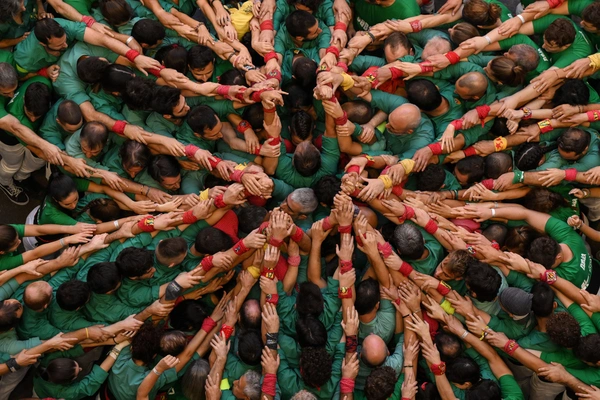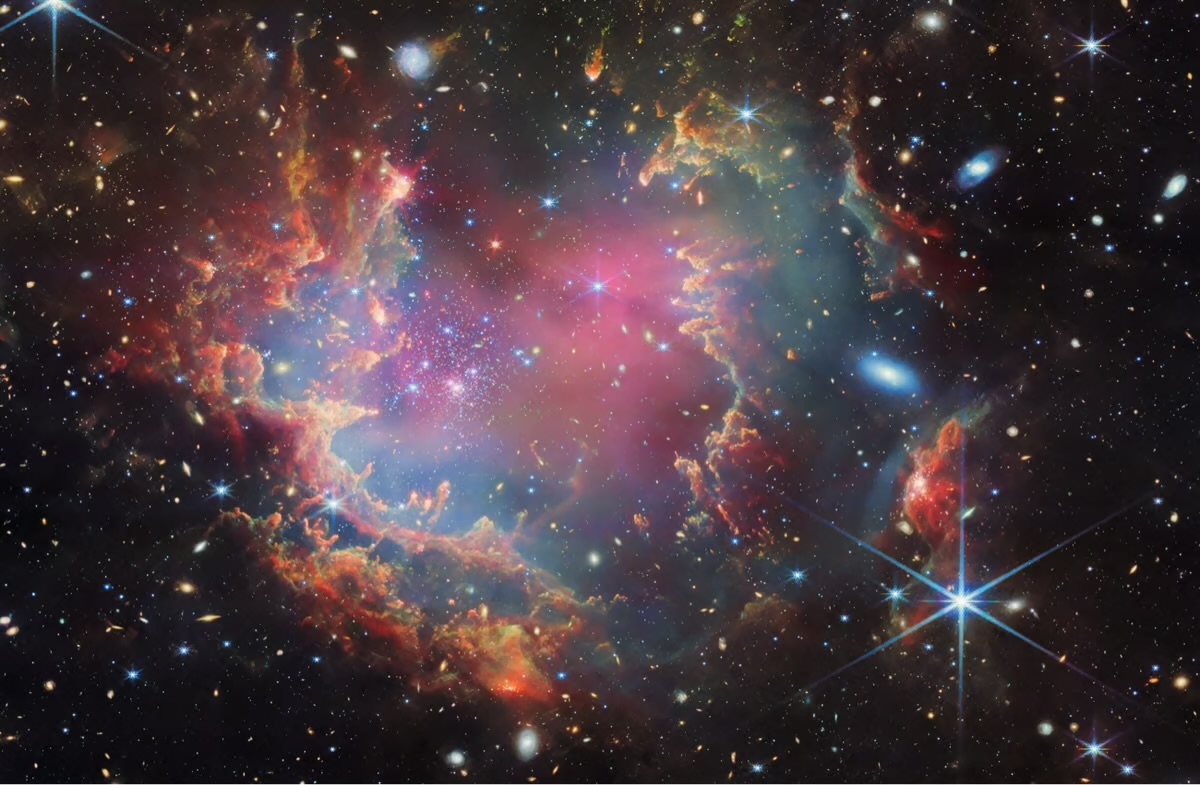On the way to the bus stop
On weekday mornings, early enough that the sun is still creeping up past the horizon, we bundle up in our jackets, grab the backpack, and walk to the bus stop.
The bus stop is a six minute walk from the house, down the hill at the end of our street; with a four-year-old, those six minutes often stretch to ten. If we play “the paint is lava,” carefully jumping over all the paint marks on the sidewalk left by surveyors and construction crews, the walk is often longer. We leave early enough to accommodate such diversions, to enjoy a morning walk to start the day without the hecticness that the day ahead will bring.
On the way to the bus, we see dozens of cars speeding past us (most of them blatantly ignoring the lower speed limit in our neighborhood), and bump into a handful of people who are out at that time.
There is the high school student that always walks by on his way to class; Zoya exclaims, “the teenager!” when we see him. He always takes the time to say good morning as he passes us along the way.
There is the man driving the Voyago van who always slows down, almost to a complete stop, and waves as he passes us on his way to pick up his morning passengers. We always wave back.
Every week or so, the recycling truck drives by as we stroll down the hill. The worker on the back of the truck says hello as the driver gently beeps his horn as they pass us. Zoya is transfixed by the enormity of the truck. Even though it stops at every driveway, it still manages to move faster than us most mornings.
Before the weather got cold, we would see Norma out on her morning walk, and she would always stop for a quick chat—not just with me, but with Zoya too. We haven’t seen her for a couple of weeks now; she had mentioned that she walks later in the day once the weather turns.
There are many neighbors walking their dogs; most of them say hello. Some of the dogs say hello too, in their own way.
When it rains, everything happens a little faster: we leave later and walk quickly down the hill. The teenager jogs by us, but still stops to say good morning. The Voyago van doesn’t stop, but we still get a wave as he drives by. The folks on the recycling truck hurry through their pickups. The dog walkers have hoods on, and don’t always see us to say hello. Still, there is life on the sidewalks, in the streets.
I do not know what to expect when the real cold settles in, when the walk will become a little more unpleasant, when the wind will chill our bones and we will be able to see our breath in the air. I do not know what to expect when the snow falls, when the world becomes a little quieter and still.
I know we may not see as many people on our walk to the bus stop, but we will still walk, still head down the hill, and wait for the bus to pull up. We will wave and say hello to the people around us, whoever they may be.
It’s our ninth anniversary today! Every day I am so grateful and blessed to be able to share my life with someone so kind, compassionate, and loving as my wife. Sending my thanks today, and every day, that we found each other.
A poem
"That’s My Dad"
D.A. Gray
for Gus
Ours was often a wordless language,
Whole conversations shared in the space
Between the hook flying from the rod,
To the splashdown in the water,
And in the waiting for the pull from some
Invisible place beneath the surface, or
Maybe the realization it wouldn't happen.
Not always deep--sometimes anger tore
Through the mind like the hook's barb;
Other times gratitude slapped one awake.
Or, like now, resting my hand on the glassy
Arm of an old rocking chair he'd worked
Nights sanding and smoothing,
Caning and coating,
And when this heirloom was passed down,
My few words, "I'll take care of it"
Were all that broke the surface.
That memory shook me watching a father on stage,
Talking tirelessly of building a team,
The hands of the son pointing, shaking,
In the audience sobbing, three words pushing
Past the hard glass surface of men,
A whole universe on the other side.
Some links
I get a lot of questions on how I can find so many things to read or keep up with all the publications and newsletters I follow around the web. The answer is easy: I use an RSS reader. And you should too, especially if you want to wean off a reliance on social media. If you do start using one, I’m happy to share my OPML file with you.
One blog I think everyone should follow in their RSS reader is Mandy Brown’s A Working Library. Here’s an excerpt from another gem by her, Coming home:
To step into the stream of any social network, to become immersed in the news, reactions, rage and hopes, the marketing and psyops, the funny jokes and clever memes, the earnest requests for mutual aid, for sign ups, for jobs, the clap backs and the call outs, the warnings and invitations—it can feel like a kind of madness. It’s unsettling, in the way that sediment is unsettled by water, lifted up and tossed around, scattered about. A pebble goes wherever the river sends it, worn down and smoothed day after day until all that’s left is sand.
Actually, I want to share more from Mandy Brown, this time on privilege as a resource to be used:
None of the privileges that too few of us enjoy were won by people who merely did what they were told. They were fought over in big and small ways, in thousands of tiny resistances, by people who saw what was happening and refused to help it along.
My media diet for the past two months, and a few things I’ve learned over the past few months.
This is astounding: in Spain, teams of "castellers" recently gathered for the city's 29th biannual human-tower competition--working together to build the highest and most complex human towers (castells) possible.

Point Nemo is the most remote place on Earth, and its discovery and characteristics are fascinating.
When I was young, someone gave me the gift of a crokinole board and I admit that I really didn’t get into the game—in fact, I learned more about it from this article than I ever did growing up.
One of the best restaurant meals I’ve had recently was at a place where they served a prix fixe menu three courses, with a choice of three dishes for each course. It was simple and delightful. I still love a tasting menu, but am really enjoying this trend of paring down the excess.
This this just-released image from the JWST team of star cluster NGC 602 is mesmerizing. (More over on Kottke.org.)

This design makes me wonder why all chargers aren’t designed like retractable measuring tape. Love it.
We’re a persimmon household, so I loved this rumination on the fruit from Jenna Wortham’s newsletter:
Once persimmons start appearing at the farmer's market, I yield to the inevitability of fall and winter. They remind me of the bounty of the seasons to come. The fruit is both pleasing to the eye and palate with its soft fleshy texture and crisp hints of cinnamon. Persimmons are also teachers: They require patience to transform from bitter, astringent flesh into edible sweetness. In dreams, permissions are a reminder that we have decisions to make, that even our perceptions are a choice.
A few recipes we’ve enjoyed recently: lemon chicken with chickpeas and potatoes, and falafel-spiced turkey burgers.
“The Canadian Medical Association reports that more than 6.5 million of Canada's 41 million people lack access to regular primary care, and that a third of people who do have a family doctor wait too long for an appointment.” We’re lucky to have a family doctor, but I’ve heard from lots of friends that they’ve found it almost impossible to find one. The reasons, of course, are multi-faceted.
Quincy Jones and Murray Sinclair both passed away this week. Each had lasting and profound impact on society—Jones shaped popular music as we know it, and Sinclair set the foundation for a more just and restorative Canada. They’ll both be missed.